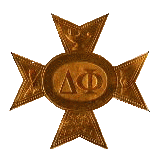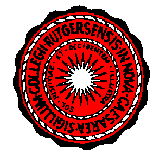

A Brief History of Epsilon
The First Fraternity at Rutgers...The Oldest Student Organization at Rutgers



The Founders
In the winter 1845, the Epsilon Chapter of Delta Phi was founded, with the
help of the Gamma chapter, by the following twelve men (in order of initiation):
It was a bold step, for no men at Rutgers previously had had the courage to engage in the experiment that had taken place on only a few other college campuses before: the social college fraternity. And, it was for good reason that no one had, the existing student organizations, the alumni and the administration were all opposed to the concept. Terms frequently used to assail the new group were, "radicalism," "un-American," and "...the direst sort of hooliganism." In what is truly a fitting lesson for our times, it was the outstanding character and academic achievement of its members that convinced the faculty to support the new fraternity. Their support helped the chapter survive and ultimately lay the groundwork for other fraternities and later sororities.
The early meeting places of the chapter were numerous: hotels, graveyards, and masonic temples were the most frequent spots. Ironically, several meetings took place at the old City Hotel at the corner of Albany and Neilson streets, the same corner where Rutgers College (nee Queen's) had held session at the old Sign of the Red Lion Tavern during its own formative stage.
During the subsequent years, Delta Phis at Rutgers were instrumental in the development of college life. Delts were amongst the founders of Rutgers' first athletic teams (many of which were amongst the first in the country as well) including crew and baseball. In 1869, Rutgers Delts, with their counterpart Delts at Princeton, were instrumental players and organizers of the first intercollegiate college football game, won by Rutgers, 6-4. Delta Phis were also amongst the founders of the Rutgers Targum, the nations second oldest college newspaper and the Scarlet Letter, the annual yearbook. In fact, the use of a school color at all was an innovation pushed for by members of Delta Phi.
Epsilon finally found a place to call its own when, forty-two years (1887) after becoming the first fraternity at Rutgers, Delta Phi became the first Rutgers fraternity to own its own house. "Bishop" Ten Eyck, the founder, laid the cornerstone and, it is rumored, placed his own bible within. It is also around this time,the late 1880s, that the use of the moniker St. Elmo came into association with this chapter of Delta Phi, as it has with several others. Our National History page has a more detailed explanation of the term St. Elmo. The house, which partially burned in a fire, ironically forty-two years after that (1929) is now the Office of the Dean of the Faculty of Arts and Sciences and is located at Seventy-Seven Hamilton Street on the College Avenue Campus, directly behind Olde Queens.
The current chapter house at 17 Union Street has been continuously occupied by us since 1930. It is the former residence of James Wood Johnson of Johnson & Johnson. The renovation into its current appearance was funded by our alumni under the leadership of John Wyckoff Mettler, E 1895, at the time the chaiman of the Rutgers Board of Trustees Grounds committee. That it shares its Georgian colonial look with many Rutgers buildings was purely intentional but is precisely the kind of intimate connection to Rutgers has symbolized our 150 year presence on the banks. Many familiar names from campus buildings such as Demarest, Brett, Mettler, Silvers, Bishop, Carpender, Voorhees, Nielson and others have been culled from the alumni of Delta Phi. The first two on that list each served as president of Rutgers University.
Over the years, numerous Delts have played on almost every athletic team, occupied seats on the student government, led countless student organizations and many have been accepted into prestigious campus societies such and Cap and Skull and Phi Beta Kappa. The legacies of leadership and inovation are mantles we bear with pride for they solidify the tradtional pillars of friendship, morality and literature that were established for us over 150 years ago.
Today, with a diverse, but select membership, Delta Phi is still a campus leader. Our commitment to community service, scholarship, as well as an active social calendar are the natural extensions of where we have come from and where we will continue to go. We fully expect the next 150 years to be as fruitful as the past have been.